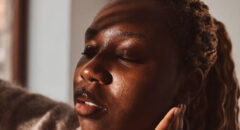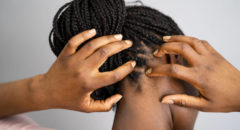
Seborrheic dermatitis is a common skin condition that affects people of all races, but it can present unique challenges for Black Americans due to differences in hair texture, skin type, and cultural grooming practices. Despite the condition’s prevalence, discussions around seborrheic dermatitis often fail to consider the specific ways it affects Black people, especially when it comes to treatment and management.
This article explores how seborrheic dermatitis impacts Black Americans, why the condition may manifest differently in Black skin, and the best treatment approaches to manage it effectively.
Understanding Seborrheic Dermatitis
Seborrheic dermatitis is a chronic inflammatory skin condition that typically affects areas of the body with a high concentration of sebaceous (oil) glands, such as the scalp, face, and chest. It is characterized by:
- Scaly, flaky skin that can appear white or yellowish.
- Itchy, red patches of inflamed skin.
- Oily or greasy-looking areas, particularly on the scalp and face.
In Black Americans, seborrheic dermatitis often shows up as flaking in the scalp and hairline, sometimes extending to the face and upper body. The condition can be confused with dandruff or other scalp issues, making it essential to seek proper diagnosis and treatment.
How Seborrheic Dermatitis Manifests in Black Skin
Seborrheic dermatitis can look different on Black skin compared to lighter skin tones due to melanin’s role in skin pigmentation and healing. Here’s how the condition uniquely affects Black Americans:
1. Scalp Issues and Hair Texture
One of the most significant challenges Black Americans face with seborrheic dermatitis is managing the condition on the scalp. Black hair tends to be coarser, curlier, and more prone to dryness, which can complicate the treatment process. Seborrheic dermatitis often leads to:
- Visible scaling or flaking: These white or yellow flakes can be particularly noticeable on darker skin and coiled hair, creating both physical discomfort and aesthetic concerns.
- Itchiness and irritation: The itchiness associated with seborrheic dermatitis can lead to frequent scratching, which may result in further irritation, scarring, or hair breakage.
- Hair loss: In severe cases, the inflammation can cause temporary or permanent hair thinning, known as seborrheic alopecia. This occurs when the scalp becomes severely irritated and the hair follicles are damaged.
2. Hyperpigmentation
Black Americans with seborrheic dermatitis may experience post-inflammatory hyperpigmentation (PIH). This condition leaves dark spots or patches of skin where inflammation or irritation has occurred, making seborrheic dermatitis even more visible and distressing.
3. Treatment Challenges with Haircare Practices
Traditional hair care practices in the Black community, such as braiding, twisting, and the use of oils and pomades, may complicate seborrheic dermatitis management. Heavy oils and creams can trap moisture and create an environment where Malassezia yeast (which contributes to seborrheic dermatitis) thrives. However, stopping these practices altogether is often not a practical or culturally sensitive solution, making customized treatment approaches crucial.
Unique Treatment Considerations for Black Americans
Treating seborrheic dermatitis in Black Americans requires an approach that respects both the unique characteristics of Black skin and hair, as well as cultural practices. Here’s what to consider when managing the condition:
1. Medicated Shampoos for the Scalp
One of the primary treatments for seborrheic dermatitis on the scalp is medicated shampoos. These shampoos often contain ingredients like:
- Ketoconazole: An antifungal that targets yeast overgrowth.
- Zinc pyrithione: Soothes inflammation and reduces flaking.
- Salicylic acid: Helps to lift and remove dead skin and scale buildup.
While these shampoos are effective, frequent washing can be difficult for Black Americans with coily or tightly curled hair, as it may lead to excessive dryness and damage. A recommended approach is to limit washing to once or twice a week and focus on using these shampoos only during flare-ups. During off days, a moisturizing shampoo and deep conditioner can help keep the hair and scalp hydrated.
2. Moisturizing the Scalp and Hair
One of the major challenges in treating seborrheic dermatitis in Black hair is balancing the need to control oil and flaking without over-drying the scalp. Lighter oils (such as jojoba or argan oil) may provide moisture without clogging the pores or worsening the condition. A key tip is to:
- Avoid heavy products like thick pomades or petroleum-based products, which can trap oil and worsen symptoms.
- Use water-based moisturizers that hydrate the scalp and hair without adding excess oil.
3. Topical Treatments for Face and Body
When seborrheic dermatitis affects areas like the face or chest, topical antifungal creams such as ketoconazole or clotrimazole are commonly prescribed. For Black skin, it’s important to:
- Address hyperpigmentation: Topical treatments containing ingredients like niacinamide or vitamin C can help lighten dark spots caused by post-inflammatory hyperpigmentation.
- Choose gentle cleansers: Using non-irritating, fragrance-free cleansers can help prevent further irritation. Avoid harsh soaps that strip the skin of natural oils.
4. Alternative Natural Remedies
Some Black Americans prefer to incorporate natural or holistic treatments into their seborrheic dermatitis management. While these may not replace medicated treatments, they can be used alongside them to provide relief. Popular natural remedies include:
- Tea tree oil: A natural antifungal that can help reduce yeast on the skin. It should always be diluted before application to avoid irritation.
- Aloe vera: Soothes inflamed skin and reduces redness, making it a good option for the face and body.
However, it’s essential to consult with a dermatologist before relying solely on natural remedies, as these may not be potent enough for severe cases.
The Psychological Impact of Seborrheic Dermatitis
For many Black Americans, seborrheic dermatitis goes beyond physical discomfort—it can affect self-esteem, confidence, and mental well-being. Visible scaling, flaking, and hyperpigmentation can lead to social embarrassment, anxiety, and stress. Hair loss caused by seborrheic dermatitis can be especially difficult, given the importance of hair in Black culture as a symbol of identity and pride.
Managing Flare-Ups and Maintaining Healthy Skin
Since seborrheic dermatitis is a chronic condition, learning how to manage flare-ups is essential. Here are a few tips to keep symptoms under control:
- Stick to a consistent scalp care routine: Even if flare-ups subside, using medicated shampoos intermittently and following a gentle scalp-care routine can help prevent future episodes.
- Moisturize regularly: Keeping your skin and scalp hydrated is crucial, especially for Black Americans who may be more prone to dryness.
- Consult a dermatologist regularly: A dermatologist can help tailor treatment to your specific needs and ensure that you’re using the right products for your hair and skin type.
Seborrheic dermatitis presents unique challenges for Black Americans, particularly when it affects the scalp and hair. The condition may cause visible flaking, irritation, and even hair loss, but with the right treatments and lifestyle adjustments, it can be managed effectively.
A combination of medicated shampoos, proper moisturizing, and attention to cultural grooming practices can help control symptoms and reduce the frequency of flare-ups. It’s also important to consult a dermatologist for a treatment plan that suits both your skin and hair type, ensuring you can manage seborrheic dermatitis without sacrificing hair health or personal comfort.









